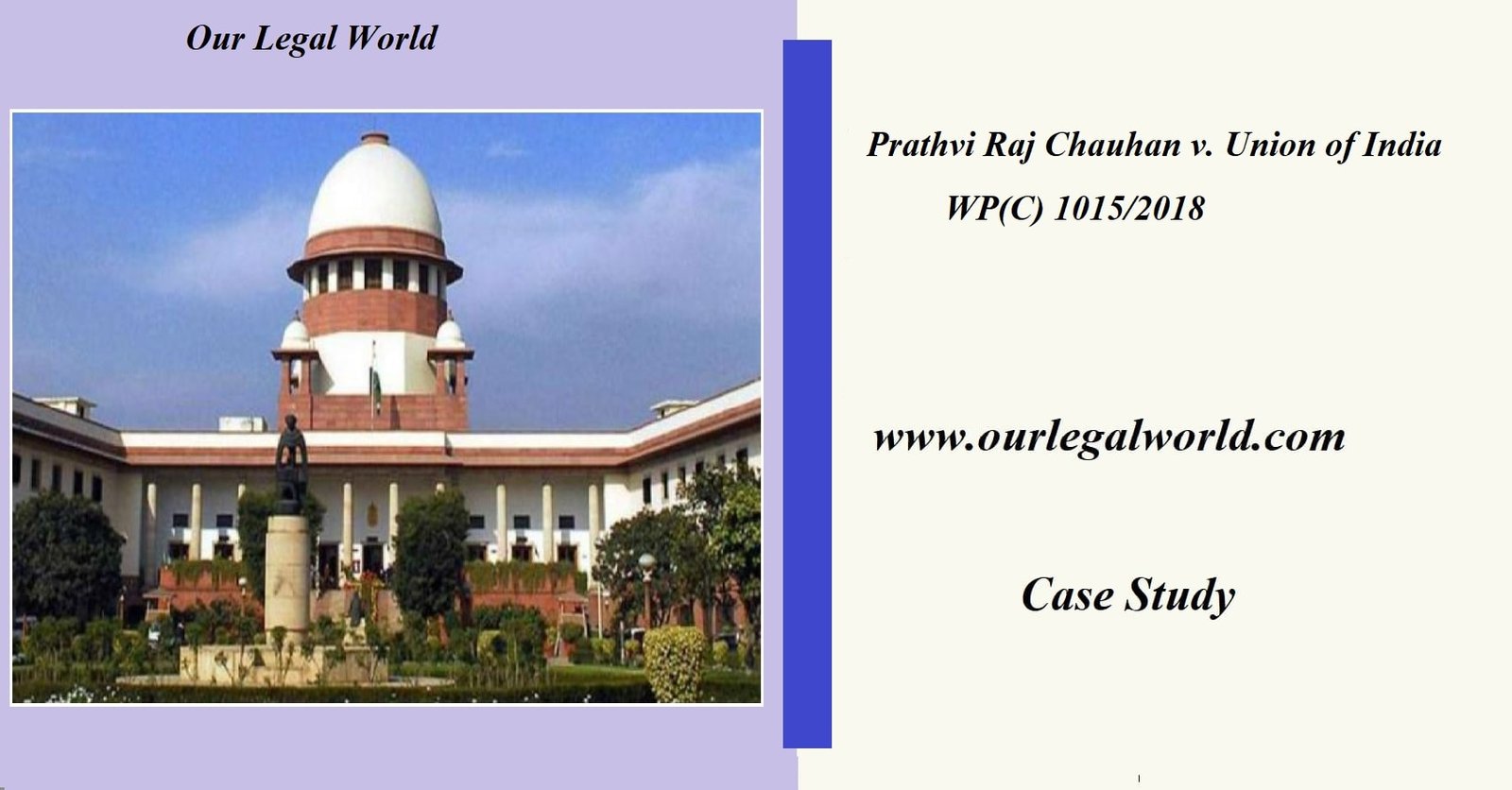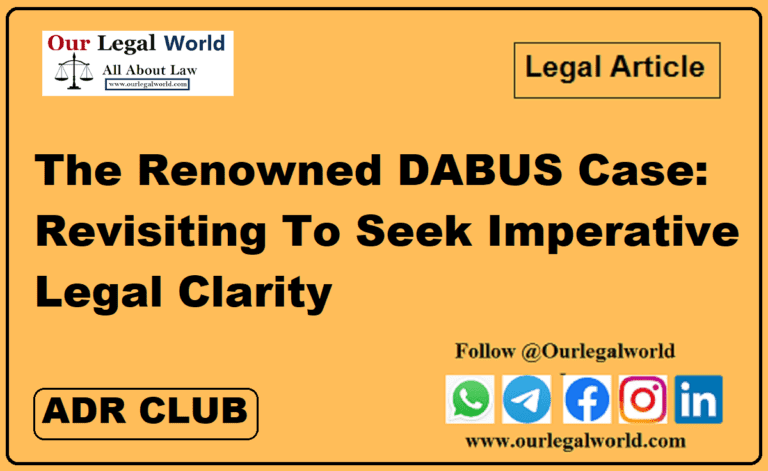Prathvi Raj Chauhan v. Union of India: Case Analysis
CASE– Prathvi Raj Chauhan v. Union of India CASE NO. – WP(C) 1015/2018 DATE OF DECISION– 10 February, 2020 COURT– Supreme Court of India JUDGES– Arun Mishra, Vineet Saran, S. Ravindra Bhat
INTRODUCTION:
The centuries old caste system in India has deprived millions of backward class people from basic human rights. It gave free license for upper class to consolidate their societal dominance by all means possible. Therefore the legislature in its wisdom enacted The Scheduled Castes and Tribes (Prevention of Atrocities) Act, 1989 to prevent commission of offences against SC/ ST and provide strict penal measures for offenders.
The Honourable Supreme Court of India in its judgment Dr. Subhash Kashinath Mahajan vs The State of Maharashtra & Anr., (2018) defanged stringent provisions of Act causing all around protests. This nudged Government to bring out Scheduled Castes and Scheduled Tribes (Prevention of Atrocities) Amendment Act of 2018 for negating the aforesaid judgement. The Constitutional validity of Amendment was challenged in Supreme Court of India resulting in landmark judgment of Praithvi Raj Chauhan vs Union of India.1
BRIEF FACTS:
The Scheduled Tribes (Prevention of Atrocities) Act, 1989 is an Act to prevent the commission of offences of atrocities against the members of the Scheduled Castes and the Scheduled Tribes, to provide for Special Courts for the trial of such offences and for the relief and rehabilitation of the victims of such offences was enacted on 11th September 1989. The Act does not have anticipatory bail provision for offences registered under it.
The Honourable Supreme Court of India in Dr. Subhash Kashinath Mahajan 2 judgement dated March 20, 2018, examined the stringency of 1989 act and passed following directions, with contempt for non compliance:
—————————————————————————————————————–
- Praithvi Raj Chauhan vs Union of India SCC 159 (2020)
- Dr. Subhash Kashinath Mahajan vs The State of Maharashtra & Anr.6 SCC 454 (2018)
- There is no absolute bar against grant of anticipatory bail in cases under the Atrocities Act if no prima facie case is made out or where on judicial scrutiny the complaint is found to be prima facie mala fide.
- Arrest of a public servant can only be after approval of the appointing authority and of a non-public servant after approval by the S.S.P.
- Preliminary enquiry may be conducted by the DSP concerned to find out whether the allegations make out a case under the Atrocities Act and that the allegations are not frivolous or motivated. cases under the Act could be registered only after a preliminary enquiry into the complaint
- Reasons for arrest must be scrutinized by the Magistrate for permitting further detention
The section 18 of the Scheduled Castes and Scheduled Tribes (Prevention of Atrocities) Act, 1989 (Act of 1989) was amended in 2018 inserting new Section 18A given below;
(i) For the purpose of this Act,-
(a) Preliminary enquiry shall not be required for registration of a First Information Report against any person;
(b) The investigating officer shall not require approval for the arrest, if necessary, of any person, against whom an accusation of having committed an offence under this Act has been made, and no procedure other than that provided under this Act or the Code shall apply
(ii) The provisions of section 438 of the Code shall not apply to a case under this Act, notwithstanding any judgment or order or direction of any Court.”
The amendment was challenged in Supreme Court of India for violative of directions issued in Subhash Kashinath Mahajan case.
ISSUES INVOLVED:
- Nexus between Fundamental Rights and 1989 Act
- Legality of Anticipatory bail under section 438 CrpC for offences registered under Atrocities Act 1989
- Protective discrimination to SC/ST individuals vis vis directions issued in Subhash Kashinath Mahajan case
- Validity of Scheduled Castes and Scheduled Tribes (Prevention of Atrocities) Amendment Act of 2018 in light of Constitutional safeguards to SC/ ST
- Legal standing of directions and practicality of directions issued in Subhash Kashinath Mahajan case in comparision with Social economic backwardness- Non equality, untouchability, civil rights, basic rights of dalits as well as tribals
DISPOSITION
All the judges concurred in present judgement but one of judges penned down his own rationale for judgement. It upheld the Constitutional validity of Scheduled Castes and Scheduled Tribes (Prevention of Atrocities) Amendment Act 2018. The judgement recognised the abysmal conditions of SC/ST in the country and need for protective discrimination through Atrocities Act 1989 to maintain dignity as well as sense of justice for these downtrodden people.
I-Interconnections between Fundamental Rights and the 1989 Act
The socially backward people face frequent harassment, ridicule, loss of self respect and even violence at times only on basis of caste. The socio economic condition of these persons is pitiable with no means of fighting injustice against the powerful upper castes. The 1989 act is only deterrence and remedy available to them, enabling them to live life of dignity. The right to live with dignity has been recognised as integral part of Right to Life (Article 21) in various case laws Francis Coralie case 3and Olga Tellis case 4. Therefore any dilution of Act shall compromise the dignity of SC/ST individuals, violating their Fundamental Right to Life under Article 21.
—————————————————————————————————————–
3– Francis Coralie Mullin v. Union Territory Delhi, Administrator, AIR SC746 (1981)
4- Olga Tellis v. Bombay Corporation, AIR SC 180 (1986)
The Article 15 of Indian Constitution clearly states that
(1) The State shall not discriminate against any citizen on grounds only of religion, race, caste, sex, place of birth or any of them
(2) No citizen shall, on grounds only of religion, race, caste, sex, place of birth or any of them, be subject to any disability, liability, restriction or condition with regard to
(a) access to shops, public restaurants, hotels and places of public entertainment; or
(b) the use of wells, tanks, bathing ghats, roads and places of public resort maintained wholly or partly out of State funds or dedicated to the use of the general public…”
The 1989 Act is a step to prevent caste based discrimination in society and establish egalitarian ethos among citizens. It provides for very strong penal measures for offenders so that people refrain from any misadventure against lower castes. The 2018 amendment does away with provision of anticipatory bail and preliminary enquiry before arrest. The fear of arrest and subsequent punishment is being reinforced which cannot be bad in statutory or constitutional law.
II- Anticipatory bail-
The provision of anticipatory bail was introduced for the first time on the recommendation of 41st Law Commission in 1973. It is a statutory right, not part of the right to life and personal liberty under Article 21 of the Constitution, and thus there is no fundamental right to anticipatory bail.
The offenders have to think twice before resorting to any illegal means due to no option of anticipatory bail. The peculiar circumstances and fractions of Indian society necessitate like measures to help SC/ST persons.
III- False complaints-
The apprehension of lodging false complaints under 1989 Act as an act of vengeance or other reasons was one of the prime reasons for directions issued in Subhash Kashinath Mahajan case. However the above reasoning is improper as it did not take in to consideration the entirety of casteism prevalent in India.
The Honourable Court has dwelt upon different aspects on the illogicity of false complaints-
- For lodging a false report, it cannot be said that the caste of a person is the cause. It is due to the human failing and not due to the caste factor.
- Disadvantaged background hesitant in filing complaint, so the chances of false filing are minimal
- Pre judgement of being liar is illegal. The benefit of doubt must be given to complaint.
- Falsity of complaints may be due to faulty investigation
- Any aggrieved person may approach concerned High Courts for Quashing FIR, if complaint is false
IV- Permission of sanctioning authority for Government servants before FIR-
The direction requiring sanctioning of appointing authority for prosecution under 1989 Act has its disadvantages causing travesty of justice. This is due to –
- It is Non statutory and offences under 1989 act being cognizable and non bailable, against provisions of CRPC and IPC
- The Basis for acceptance or refusal of sanction is arbitrary to discretion of sanctioning authority
- Time consuming and absence of any knowledge to apply mind towards reasonable conclusion ,especially since enquiry is not complete
- Refusal to grant permission for arrest and meddling in criminal investigation
- Dangerous to safety of complainant
V- Approval of SSP for arresting Non Government servant-
- It fetters undue discretionary powers to SSP, which is not desirable
- Delay in investigation as SSP is busy in many other things, being head of district
- The offences under 1989 Act are cognizable and non bailable granting automatic authority for arrest by police
V- Magistrate to scrutinize the reasons for permitting further detention:
The recording of reasons and scrutiny by Magistrate consequently after arrest for offences under 1989 Act is not provided in legislation nor any case laws. It is an extra legal measure which cannot be sanctified.
VI- DSP for preliminary inquiry:
It will hamper investigation due to lack of availability of officers at DSP level. The preliminary inquiry is not contemplated in 1989 Act and hence illegal. It also casts doubt on credentials of lower ranked police officers like Police inspectors and sub inspector. Moreover preliminary inquiry is permissible only in the circumstances as per the law laid down by a Constitution Bench of this Court in Lalita Kumari case .5
VII- Judicial intervention
Concerning the applicability of provisions of section 438 CrPC, it shall not apply to the cases under Act of 1989. However, if the complaint does not make out a prima facie case for applicability of the provisions of the Act of 1989, the bar created by section 18 and 18A (i) shall not apply.
CRITICAL ANALYSIS:
Historical injustice
The Dalits and Tribals have faced historical oppression at hands of upper caste people. They faced humiliation in all facets of life and were denied equality in status and opportunities. These people remained laggards in all indicators of socio economic development. Their voices and dissent were brutally suppressed without any recourse to justice, just because of casteism.
As per National Crime Records Bureau (NCRB) 2016 report 6 for crimes against SC/ST,
—————————————————————————————————————-
5- Lalita Kumari v. Government of U.P 2 SCC 1 (2014)
6-https://ncrb.gov.in/StatPublications/CII/CII2016/pdfs/Table%207A.1.pdf
422,799 crimes against scheduled caste communities’ members and 81,332 crimes against scheduled tribe communities’ members were reported between 2006 and 2016.
| Sr. No. | Year | Crimes against SC/ST |
| 1 | 2014 | 40401 |
| 2 | 2015 | 38670 |
| 3 | 2016 | 40801 |
The Statement of Objects and Reasons accompanying the Scheduled Castes and Scheduled Tribes (Prevention of Atrocities) Bill, 1989 reads as-
“Despite various measures to improve the socio-economic conditions of the Scheduled Castes and the Scheduled Tribes, they remain vulnerable. They are denied number of civil rights.
They are subjected to various offences, indignities, humiliations, and harassment. They have, in several brutal incidents, been deprived of their life and property. Serious crimes are committed
against them for various historical, social, and economic reasons. A special legislation to check and deter crimes against them committed by non-Scheduled Castes and non-Scheduled Tribes has, therefore, become necessary”
Inspite of 1989 Act, the crimes against SC/ST have not stopped, requiring further stringent provisions in the Act and not dilution. There has to be a credible deterrent preventing commission of offences against downtrodden in society and fulfilling constitutional obligations towards them.
Doctrine of Separation of Powers
The Constitution of India lays down strict separation of powers between judiciary, executive and legislature. This Doctrine of separation of powers constitutes basic feature of Indian Constitution as laid down in Kesavananda Bharati judgement.7
———————————————————————————————————————————————————————
7- Kesavananda Bharati v. State of Kerala 4 SCC 225: AIR SC 1461 (1973)
The Supreme Court has issued guidelines relating to 1989 Act in Subhash Kashinath Mahajan case. It has exceeded its jurisdiction in present instance as legislation making is not their domain. The court can only step in wherever there are lacunas in acts or the acts are ultra vires of constitutional provisions
Judicial remedies-
Though the Honourable Supreme Court of India has assented to Scheduled Castes and Scheduled Tribes (Prevention of Atrocities) Amendment Act of 2018, it has retained the judicial remedy if no prima facie case is being made out under provisions of 1989 Act.
The victim may approach Sessions Courts to avail anticipatory bail against offences registered under 1989 Act and subsequently higher judiciary, if no relief is granted. This will add to the already overburdened judiciary on pendency of cases. It will add to misery of complainant and delay the process of justice. There is also a possibility of rich and powerful escaping the long arm of law by engaging best of lawyers. The judicial delivery system for offences against SC/ST may be subverted in this instance along with the constitutional guarantees.
It also denies the legitimacy of legislature by unnecessary judicial niggling. India follows parliamentary democracy where elected representatives make laws as per needs and aspirations of people. The legislature has full authority to make and pass laws within constitutional framework. When the 1989 Amendment Act 2018 has been validated in Court of law, introduction of judicial oversight is contrary to tenets of law.
Author: Umesh Verma (CENTRAL INDIA COLLEGE OF LAW NAGPUR MAHARASHTRA)
This Case Comment was shortlisted in 1st Our Legal World National Case Comment Writing Competition 2020







